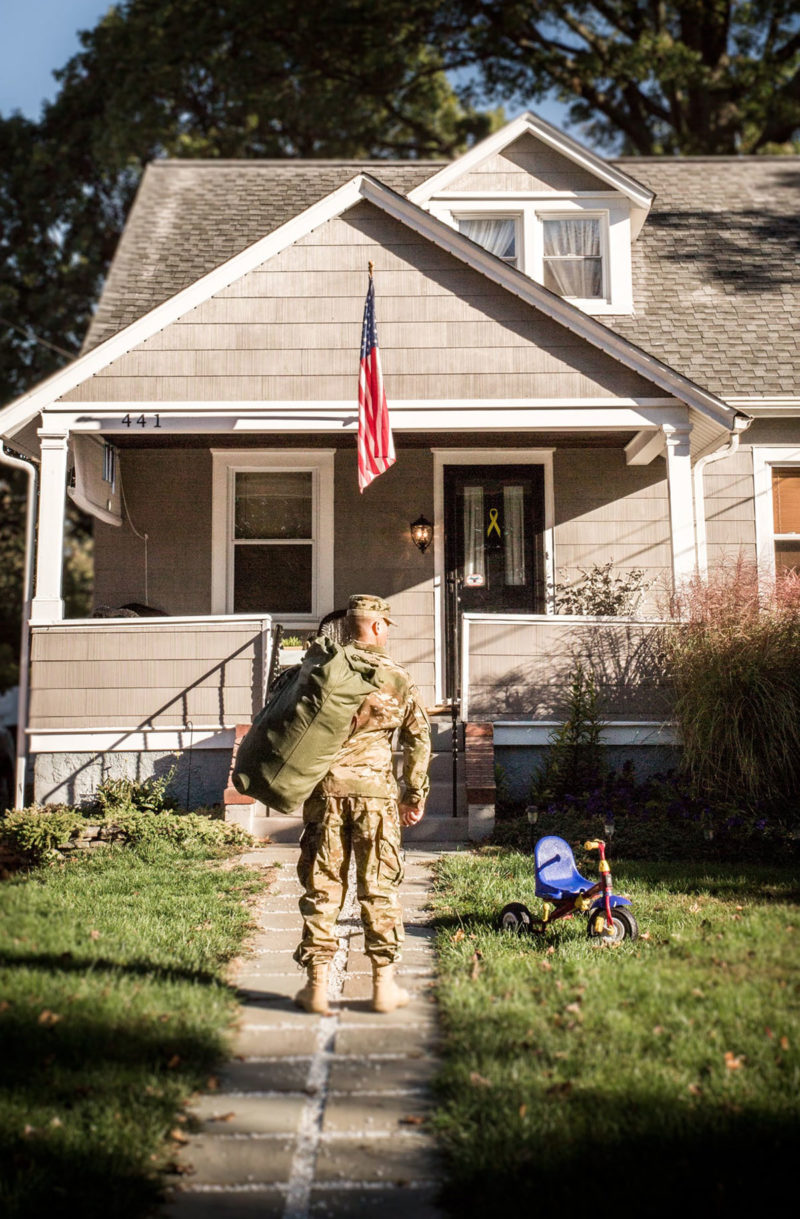Time for Honest Communication
Week Summary
What is one step you can take to improve communication in your marriage?
Communication is key for a strong marriage, and it’s a challenge during reintegration and post-deployment. This week we meet Nehemiah, an important official to the Persian king. Nehemiah is a perfect example of healthy communication: he listened with empathy, responded with honesty, and proceeded discretely to find a solution. May God teach us to be slow to speak, quick to hear, and caring with action.
About This Journey
Reintegration is hard: it messes with rhythms and feels uncomfortable. “Reunited and Resilient” tells the story of how God stirred a king to change the trajectory of a nation. Follow along as God shows us how He can also stir your family’s hearts to reach for restoration as you journey toward reintegration following deployment.
This Week's Readings
“We Need to Talk”
Read
Now it happened in the month of Chislev, in the twentieth year, as I was in Susa the citadel, that Hanani, one of my brothers, came with certain men from Judah. And I asked them concerning the Jews who escaped, who had survived the exile, and concerning Jerusalem. And they said to me, “The remnant there in the province who had survived the exile is in great trouble and shame. The wall of Jerusalem is broken down, and its gates are destroyed by fire.”
As soon as I heard these words I sat down and wept and mourned for days, and I continued fasting and praying before the God of heaven.
-Nehemiah 1:1-4Reflect
“We need to talk.” No one would argue that communication is a key ingredient to a healthy marriage, but prefacing a conversation with these four words can cause dread in the most talkative spouse. Effective communication is not an innate skill, but something we must learn. Research verifies the importance of communication in building and maintaining marriage relationships. Research has also shown that reestablishing communication is one of the challenging hurdles couples must face during reintegration and post-deployment.
Just consider the on-going practice of OPSEC (Mission Operational Security) during a deployment. As a couple, you may have communicated regularly via text, email, or video-chat, but there were things your military husband could not discuss. Moreover, you may have kept some information from your husband that you did not want to worry him about during his deployment. If not addressed, these protective practices could become a pattern of keeping secrets after reunion.
Nehemiah 1 offers an example of healthy communication. Some Jewish leaders came to Nehemiah and said, “We need to talk.” They gave an assessment of what was going on in Jerusalem. The need for repair and restoration was significant both for the people and for the city. Nehemiah listened with empathy to their assessment about the city. Honest communication motivated him to set a goal to improve the situation.
Communication is necessary to evaluate your circumstances following a deployment. Guard yourself from glossing over reality and succumbing to the “I’m fine … Everything is fine …” defense. Communicate with your spouse. Give each other space to offer an assessment of how things have been and express what needs to happen to rebuild your family. Ask God to give you an empathetic heart to understand your spouse’s needs.
Nehemiah also went to the Lord and said, “We need to talk.” The pain the remnant experienced moved him to pray and fast on their behalf. The issues caused him personal pain, but he did not focus on himself and the effect the news had on him.
Be assured you too can come to the Lord and say, “We need to talk.” God is ready and willing to listen.
Respond
In what ways have you become more aware of your spouse’s needs since deployment and reintegration? Has communication with your spouse become better or worse since deployment or reintegration? How have you seen this demonstrated?
Prayer
Father, I pray today for improved communication between my husband and me. Teach us to listen to one another—to be slow to speak and quick to hear. Amen. (See James 1:19)
“What’s Wrong?”
Read
In the month of Nisan, in the twentieth year of King Artaxerxes, when wine was before him, I took up the wine and gave it to the king. Now I had not been sad in his presence. And the king said to me, “Why is your face sad, seeing you are not sick? This is nothing but sadness of the heart.” Then I was very much afraid. I said to the king, “Let the king live forever! Why should not my face be sad, when the city, the place of my fathers’ graves, lies in ruins, and its gates have been destroyed by fire?” Then the king said to me, “What are you requesting?” So I prayed to the God of heaven. And I said to the king, “If it pleases the king, and if your servant has found favor in your sight, that you send me to Judah, to the city of my fathers’ graves, that I may rebuild it.”
-Nehemiah 2:1-5Reflect
Hiding some of your feelings and concerns is easy when you are thousands of miles away from your spouse. Even if your communication was steady during deployment, having your military man at home can be up close and personal. For some, “up close and personal” can translate to “in my space and awkward.”
Nehemiah’s job description was cupbearer to the king. Persian kings were famous for their drinking parties. The cupbearer was the designated person to carry the wine and give it to the king. Chapter 2 of Nehemiah takes place about four months after Nehemiah received the bad news about the poor condition of Jerusalem. As Nehemiah handed a cup of wine to the king, the king noticed Nehemiah’s sad countenance. Not wanting gloominess to overcome his party and showing some genuine concern, he asked Nehemiah the reason for his sad face.
How do you generally respond when someone asks, “What’s wrong?” You may really want to tell them, but at the same time, you are terrified of the reaction. What if they minimize your feelings or doubt your reasoning? What if you have been working up the courage to ask a question and finally the opportunity comes, but you are suddenly afraid of the possible answer?
Perhaps such thoughts were swirling in the mind of Nehemiah when the king asked him, “What’s wrong?” Was the king angry because he was sad during a festive moment? Would the king react favorably to Nehemiah’s concern for Jerusalem?
We are not privy to why Nehemiah became afraid, but what stands out to me is that he overcame his fear. He asked the king to let him go to rebuild Jerusalem.
When you are face to face with your spouse, you can read in his countenance what you may never see in a text message or email. It takes concern to ask, “What’s wrong?” It takes courage to open up and share what is bothering you. Love shows concern and is courageous. Love overlooks imperfections for criticism, but searches out hurts for healing. Some people are more intuitive than others. Do your best to listen carefully for pain within your spouse. If you think you hear it, ask the question. Take time to understand your spouse’s pain and ask the Lord’s help for healing.
Respond
What does Psalm 42:5 tell you about countenances? What would you answer if God asked you, today, “What’s wrong?”
Prayer
Father, thank you for being a shield about me, my glory, and the lifter of my head (Psalm 3:3). Help me to be honest with my words and caring with my actions. Amen.
The Fine Art of Discretion
Read
So I went to Jerusalem and was there three days. Then I arose in the night, I and a few men with me. And I told no one what my God had put into my heart to do for Jerusalem. There was no animal with me but the one on which I rode. I went out by night by the Valley Gate to the Dragon Spring and to the Dung Gate, and I inspected the walls of Jerusalem that were broken down and its gates that had been destroyed by fire. Then I went on to the Fountain Gate and to the King’s Pool, but there was no room for the animal that was under me to pass. Then I went up in the night by the valley and inspected the wall, and I turned back and entered by the Valley Gate, and so returned. And the officials did not know where I had gone or what I was doing, and I had not yet told the Jews, the priests, the nobles, the officials, and the rest who were to do the work.
-Nehemiah 2:11-16Reflect
We live in a TMI culture—too much information. People process the deep dark things of life on social media for the entire world to read. Am I the only one who struggles with such blatant openness? I will just say it: Some folks need to rediscover the fine art of discretion. I know, I know—I am on a soapbox and sound preachy. Forgive me. No, I take that back. I believe there is some information you need to keep to yourself.
I admire Nehemiah’s discretion. He arrived in Jerusalem knowing the task to rebuild was not going to be easy. We find out right away that he encountered folks who were not happy about his presence and his purpose (Nehemiah 2:9–10). He did not overreact to the criticism, nor did he rush to pull together supporters to start an immediate building project. The journey had been long, and the task ahead would take energy, so he rested.
After resting for three days, he still did not rally the people to action. Instead, he went out at night when no one else was around. He surveyed the ruins and quietly processed his thoughts. He made an honest assessment to create a practical plan. Too much was at stake to rush. He needed firsthand knowledge. Nehemiah knew he could not do the work of rebuilding alone, but he needed to spend time alone to understand his role.
When I feel needy or frustrated, my first tendency is to run to anyone who will listen. Social media adds a new dimension to “anyone.” When seeking help for your family in time of frustration or crisis, be intentional about the whom and where. Too much personal information on social media can become embarrassing, even harmful. There are good places to go for help. Go to specific, confidential people to process. Learn a lesson in wisdom from Nehemiah, and put some time and space between stimulus and response.
Respond
When you come into a new situation, like the one awaiting Nehemiah in Jerusalem, do you tend to:
a) Complain about the work ahead?
b) Run to anyone who will listen?
c) Go straight to work?
d) Assess the situation first?
What positive strategies can you follow when dealing with social media and personal issues?
Prayer
Lord, give me patience to listen and wait before I speak and act. Give me your wisdom to navigate life and relationships. Amen.
Own the Vision
Read
Then I said to them, “You see the trouble we are in, how Jerusalem lies in ruins with its gates burned. Come, let us build the wall of Jerusalem, that we may no longer suffer derision.” And I told them of the hand of my God that had been upon me for good, and also of the words that the king had spoken to me. And they said, “Let us rise up and build.” So they strengthened their hands for the good work. But when Sanballat the Horonite and Tobiah the Ammonite servant and Geshem the Arab heard of it, they jeered at us and despised us and said, “What is this thing that you are doing? Are you rebelling against the king?” Then I replied to them, “The God of heaven will make us prosper, and we his servants will arise and build, but you have no portion or right or claim in Jerusalem.”
-Nehemiah 2:17-20Reflect
Time and distance have a way of making even the strongest of relationships feel vulnerable. No matter how hard you have tried to stay connected, cracks in the wall will need repair. Time and distance also have a way of making the cracks in a relationship appear wider and impossible to mend. Do not believe such things. Hard to repair? Yes. Impossible to mend? No.
When Nehemiah inspected the wall, he discovered for himself that the walls were in ruins. After looking at the mess, Nehemiah said, “You see the trouble we are in…” The Hebrew word for trouble used here is a very strong word communicating that evil could come upon them because of the defenseless condition of their city. Nehemiah did not dwell on present calamities or future dangers. He followed his assessment with an appeal to get to work. He told the people he had the king’s authority to enter into a project to rebuild the walls. More importantly, the hand of the Lord was upon him. He cast a vision of possibility if they worked together to rebuild. You know what? The people owned it! They encouraged each other and got to work.
Whatever the level of the repair that needs to take place in your relationship, following deployment, I assure you—God wants to help you make those repairs. Nehemiah saw what he needed to do to restore the city, but he could not do it by himself. You or your husband may see areas in your relationship that need attention. Share your observations with each other and commit to owning together the vision to improve your relationship.
Respond
How would you assess the level of repair that needs to take place in the relationship with your husband following deployment? What is your vision to improve your relationship?
Prayer
Lord, thank you for my husband. Thank you for allowing us to be together again. Help us to rebuild our relationship in a way that makes it stronger than ever. Give us a godly vision for our marriage. Amen.
A Family Mission
Read
Next to him Shallum the son of Hallohesh, ruler of half the district of Jerusalem, repaired, he and his daughters.
-Nehemiah 3:12Reflect
I read Nehemiah chapter 3 and wanted to roll my eyes at the list of names. However, I have studied enough of the Old Testament to recognize their significance and not minimize their effect. As I read this list, I stopped and smiled at the words of Nehemiah 3:12. Don’t you love that the daughters of Shallum were right there beside their dad, doing their part to rebuild the wall?
The names in this chapter represent place and responsibility. Each person and each family had a section that belonged to them and for which they were responsible to repair. Men and women, parents and children, all worked on the wall. Rebuilding became a family project, mission, and goal. No one person’s part was over-emphasized as more important. Nehemiah did not bring in expert builders to extend their expert skills. Families worked together to make the repairs in the wall.
That same sense of mission can help when rebuilding your family following a deployment. A shared sense of purpose can be a stimulus for successful reintegration. The establishment of routines and the adjustment of roles may take time and require flexibility. However, if togetherness is the goal, then working together to accomplish that goal gives you a head start.
Age appropriate rebuilding ideas for your family abound. A simple and inexpensive game night can help normalize family relationships through laughter and interaction. If you do not have children, consider an event with extended family. Any positive activity you can do together with family, whether eating together, playing together, or working together, can have a productive outcome.
Respond
“Make repairs” in Nehemiah 3 can also be translated “make strong.” How does that change the way you view the lessons in Nehemiah concerning the process of reintegration? What are some positive activities you can plan for your family to build togetherness?
Prayer
Father, thank you for each person in my family. Help us to work together to make our family strong. Amen.
Resources & Info
Resources to help you and other military wives in your community.
Are you enjoying these resources?
Sign up now to save your Journey progress and your favorite Segments.
Your download is being prepared.
- Small Group Resource: Deployed 2 - Leader's Guide
- Small Group Resource: Deployed 2 - Participant's Guide



